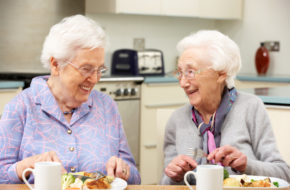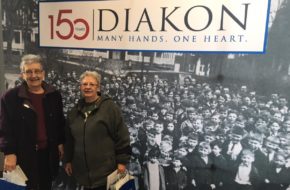The holidays can be a very emotional time for everyone, including families and friends who have loved ones dealing with Alzheimer’s disease and other forms of cognitive illnesses.
For those affected by cognitive degeneration disease, the biggest thing to remember is to be accepting of what people feel.
Holidays can be filled with a wide range of emotions ranging from pure joy to utter sadness. Regardless of the emotion, accept it and try not to judge your feelings or the feelings of others during this time. Holidays may feel and look different because traditions are not able to be followed exactly as before, but that does not mean you cannot have a meaningful experience.
Here are a few tips that can help make your holidays happier:
- Take a different perspective on the visit
One of the reasons visits can be a challenge is disease progression. Over the course of the disease, attention span changes, interests may vary and memories fade in and out. You may not be able to talk to the person the way you used to. Maybe you used to sit and have tea with your loved one. Now she can no longer sit for long periods of time or maybe she no longer likes tea. This changes our ability to connect, so we have to rethink our approach to the visit.
Forget what you know to be true and enter into their world. Often loved ones’ perceptions may be different from yours. For instance, if they can’t remember something in the past, do not argue with them. Arguing or pleading with them to remember something can increase frustration for everyone. Contradicting their reality does not work when you are visiting with someone whose brain has a difficult time making sense of the world around them.
- Be prepared to participate in an activity
Often, an activity such as listening to music or looking through a photo album may help make the visit enjoyable because it allows you to make a connection. If your loved one is in a care facility, reach out to the staff to inquire about fitting activities.
For example, a direct caregiver may be able to tell you that your loved one has a newfound love of sitting next to the garden and watching birds, something he or she may have never done before. Or perhaps a loved one has developed a new enjoyment of vanilla milkshakes or hamburgers. Use whatever current interests are to guide the visit.
Times can also play a factor in visits. Again, use your facility staff as a resource; they may be able to tell you that your loved one gets tired in the afternoon and when she gets tired, she gets tearful. Similarly, if you are bringing home a loved one for the holidays, the staff may share with you the best time to take her out and when to bring her back to reintegrate her into her surroundings.
Remember, as the disease progresses, likes, interests and best times to visit may change. What may work on one visit may not work on another. Try to stay flexible with your goals and expectations.
- Don’t ask loved ones to do something they can’t do
It is often hard for their brain to recall memories. Do not ask them ‘who am I?’ or encourage them to ‘think harder’ when they cannot recall a person or memory. As much as you desperately want to maintain a connection, asking them to do something beyond their cognitive function may cause stress and aggravation.
Cognitive impairments are heartbreaking diseases. It’s difficult to watch someone you love deteriorate and change into a totally different person in front of your eyes.
This transition induces grief and prompts questions such as “how do I still love this person if he or she is not the person I knew?” Although it may seem as if your loved one is slipping away, remember that a person with dementia wants to remember you, but his or her brain is just not physically capable of doing that.
Although you desperately want to maintain your previous connection, the greatest gift you can give yourself or your loved one is a meaningful visit reflective of the present.
Know that, even with these tips, a visit can be difficult. Sometimes, you may not know what to say or do.
Regardless, acknowledge that you are doing the best you can. If you “go with the flow,” more often than not you will have a successful visit.
—Michelle Gaugler
Personal Care Administrator
Luther Crest, Allentown, Pennsylvania
With 24 years of experience in long-term care, Gaugler understands the struggles facing residents with memory-related illnesses and their families. Dedicated to enhancing life, she has contributed to memory support for patients in all levels of care.
Because we review comments, they do not appear immediately. Please do not submit each comment more than once. Please review our comment policy.











